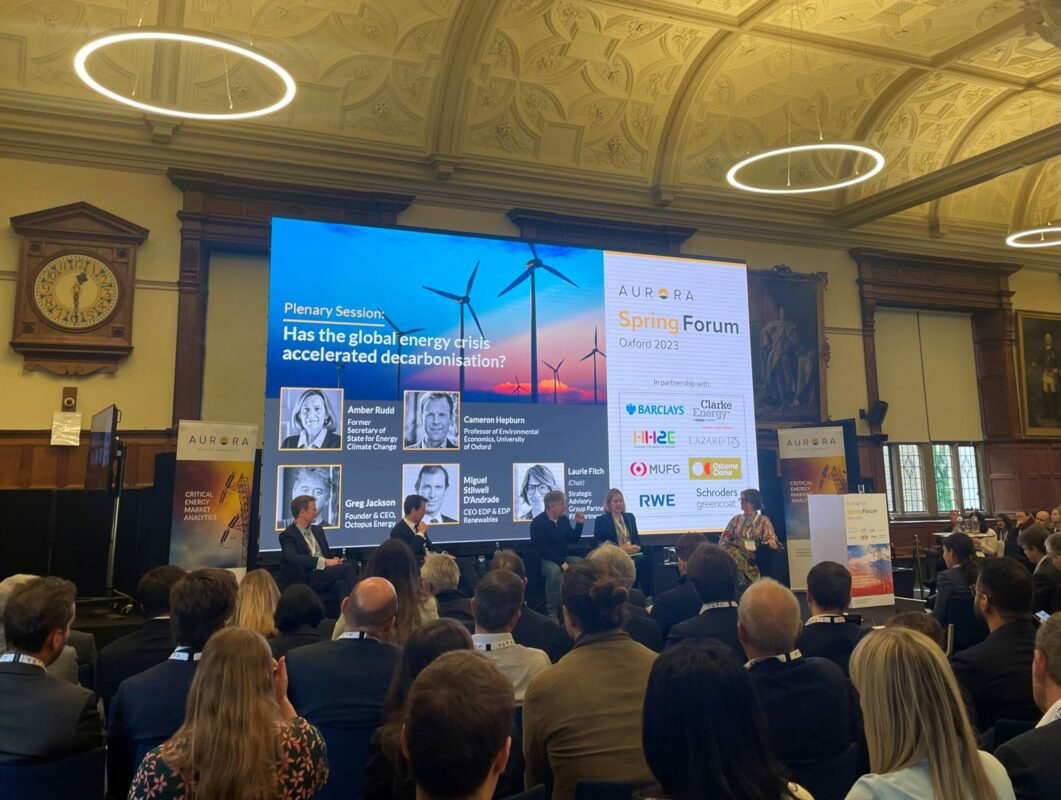
Panelists included: • Amber Rudd, Former Secretary of State for Energy and Climate Change • Cameron Hepburn, Professor of Environmental Economics at the University of Oxford • Greg Jackson, Founder & CEO, Octopus Energy • Miguel Stillwell D’Andrade, CEO EDP & EDP Renewables • Laurie Fitch, Non-Executive Director of EDP & Strategic Advisory Group Partner, PJT Partners. Image: Molly Lempriere.
Octopus’ solar and storage development in Durham has been offered a grid connection date of 2036, as constraints continue to be a huge challenge for the rollout of green technologies.
Speaking at the Aurora Spring Forum today in Oxford, Octopus’ CEO Greg Jackson highlighted the challenge of getting a grid connection for renewable developments in Britain, and the negative impact this is expected to have on the energy transition.
There’s a similar story in most of the countries the company operates, he added as part of the “Has the global energy crisis accelerated decarbonisation?” panel discussion, with networks failing to keep up demand a concern across Europe.
However, he pointed to Germany, where emergency legislation was passed to enable five LNG terminals to be built in less than a year.
It’s “astonishing” said Jackson, that despite the trillions of dollars of investment companies are keen to deploy on clean energy technologies and the prevalence of the discussion around grid connections it remains a major barrier, but LNG terminals can be rushed through permitting.
“It used to take four years to build an offshore wind farm and you hit that six more like 12,” said Jackson.
“What is the magic that enables you to do this for gas but not clean, cheap renewables?”
In response, Amber Rudd, former secretary of state for Energy and Climate Change, said: “We have to get politicians to think in the long term, which can be tricky.
“And the only way to get that to happen is to get political parties to work together, which of course we had with the Climate Change Act in 2008. So it comes back to a forcing mechanism to get that transparency and to get that commitment, but it’s hard.”
Jackson’s frustration with the system was echoed by other panelists, with Cameron Hepburn, Professor of Environmental Economics at the University of Oxford, branding the delay “unacceptable”.
“It’s ridiculous to take that long to permit an energy source, which is cheaper in cost. We’ve seen the costs fall, it’s continuing to falling costs,” he continued.
Professor Hepburn continued by suggesting that if you were to look at a CV for the national grid, you “probably wouldn’t have hired for the job of delivering on connections at the pace and speed required.”
That’s not to say that employees don’t sometimes surprise you, but in the case of the national grid enabling low-carbon to connect at the pace needed, “we need a big surprise” he said.
Between 2018 and 2021, just 4% of projects that submitted grid connection applications have so far actually resulted in a grid connection, according to Aurora Energy Research.
There are a number of key elements that could help tackle this challenge, which has been central to the discussions throughout the Aurora Spring Forum.
“First of all, there’s more than one way to skin a cat,” said Jackson. “When you have a monopoly that sits between your customer and your producer, you’re not able to explore those other ways. And so I think if we look at the countries that are looking at things like contestability for connections and grids. There may be room for a lot more innovation than we realise.”
The first contested transmission line in India, for example, cost 40% below the planned concept and was built much quicker, he said.
Other options that could be evaluated include pre-permitting or having set zones with eased permitting.

